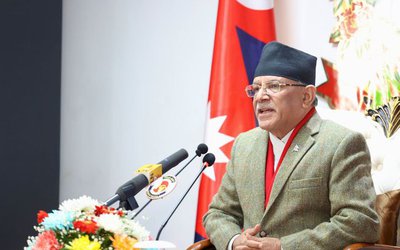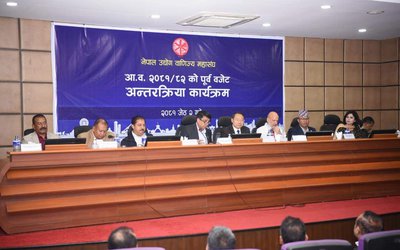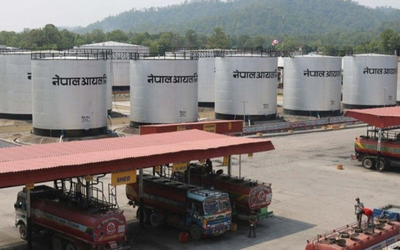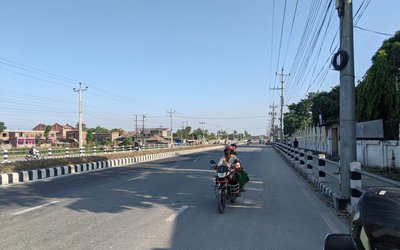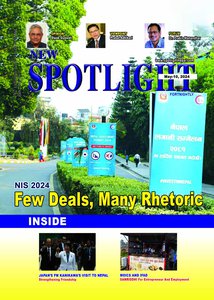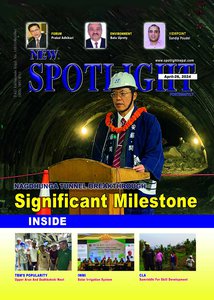
As part of Madhesh Province, Dhanusha and Mahottari have been experiencing high to extremely high levels of climate change impacts due to significant and erratic rainfall events and droughts that have impacted the lives of tens of thousands of people.
Climate change has had an impact on water resources and has increased the number altering events of water-related disasters and water scarcity in both upstream and downstream Chure. This has had an impact on the livelihoods of the poor, women, persons with disabilities, and landless people and groups that live in the southern plain and relies on agriculture with limited capacity to respond to climate shocks and stressors.
The Ratu, Aurahi, and Maraha rivers, as well as a dozen tiny rivulets, flows through the six municipalities - Bardibas, Aurahi, Bhangaha, and Gaushala of the Mahottari and Mithila and Bateshwor of Dhansuha districts of the Madhesh Province.
These rivers which originate in the Chure mountain range, during wet season causes flooding whereas it remains dry during dry seasonsresulting in negative impact in the lives and livelihoods of communities living in upstream and downstream of these municipalities.
However, the LIRIC Project changed the game by supporting these communities of six municipalities in tackling the risk posed by these extreme conditions through proper climate change adaptation and mitigation practices, tools, technologies and infrastructures while simultaneously offering opportunities for a living
"Only upstream-downstream linking and the introduction of a Payment for Ecosystem Services (PES)scheme that pays for upstream Chure forest protection can be identified as a long-term sustainable solution to the problems of these river systems, which have been made worse by climate change. Without safeguarding resources upstream, it is impossible to lessen the effects of floods and other disasters.

"The implementation of Payments for EcosystemServices (PES) systems in a coordinated manner among the communities has also begun. The capacity of nearby communities to deal with the effects of climate change has increased as the project's completion nears. As stated by Project Coordinator Tirth Kumar Timsina, "With the new concep helped to strengthen the upstream-downstream link."
Despite the fact that PES schemes are being implemented on a small scale, the project's present goal is to determine a payment method for eco system services by examining the qualitative and quantitative of services given and ways to improve them.
He claimed that safeguarding the environment upstream is necessary to control floods. Residents downstream can have a big impact by making a specific paymentto upstream conservation. A similar situation occurs in other Madhesh locations.
According to an International Centre for Integrated Mountain Development (ICIMOD) research, the Chure is largely made up of elevated topsoil and rocks, with no bedrock beneath. This renders the low-lying range vulnerable, particularly during major weather events such as rains. The study proposed upstream environmental conservation and slope management to reduce flood effects in the downstream Terai.

Because the effects of climate change are not limited to a single site or region, the Project employed more extensive techniques. This included multi-stakeholder collaborations, climate field schools, school climate change education,community based adaptation plans, local capacity building, appropriate targeting, and inclusion through research into climate risk and capability. Collaboration with local governments, a right-based approach, upstream-downstream connectivity, CSO engagement, and capacity building were all significant components of the project.
As the project nears completion, CDAFN-Bardibas, one of the implementing partners, was awarded the EU Green Award this year. The award has proved the project's usefulness and success in making the community more resilient to the effects of climate change.
"The project launched several programs aimed at river system and natural resource management, disaster risk reduction, climate change adaptation, livelihood support programs, and a climate field school." LIRIC has revolutionized the community living in the six municipalities by launching these intervention initiatives," Timsina added.
The CDAFN constructed 166 ponds in the Chure region to collect rainwater for river control. It has built 40 community-managed irrigation systems, 67 river embankments, retaining walls in sloppy hillsides to prevent landslides, and used low-cost bio-engineering methods in several upstream Chure areas to mitigate landslides and soil erosion.
Following these safeguards, the Project reactivated the 30-water system to supply water to the residents living upstream. In the downstream, the initiative encouraged the planting of fruits and vegetables on of riverbank land.

"The award is the result of the successful efforts of all the partners engaged in the implementation of the project," said Nagdev Yadav, president of CDAFN. "As the objective of this project, we can reduce the impacts of climate change and support the livelihoods of the communities, underprivileged families and poor who are at high risk due to disasters such as floods and landslides.
Yadav said that the LIRIC Project implemented numerous beneficial programs to improve incomes through efficient conservation and management of natural forests, water sources, and rivers, among other things.
Reducing Adverse Impact
Despite the fact that the six municipalities of Mahottari and Dhanusha continue to experience a variety of climate-related natural disasters, such as floods and droughts, the damage to communities is now minimal because of mitigation and adaptation efforts.
"The LIRIC Project has planned a lot of initiatives for our municipalities. We actively participated in the project from start to finish and gave them essential advice,” said Mayor Pradip Kumar Khadka, Aurahi Municipality, Mahottari and "To address the effects of climate change, the project implemented several mitigation and adaptation programs and established a favorable environment for enhancing resilience."
"I am pleased to say that the project shares information with us regarding the sectors they are working in and their method of operation. Municipality extended its cooperation and support to help their successful completion of the project."

"With the project, we collaborated and coordinated really well. We have developed special environmental and climate change rules with the project's technical assistance. These regulations were developed through collaboration between the Municipality and the LIRC Project,” said Mayor Khadka.
Progress of the Project
The LIRIC project has also supported the development of 87 Civil Society Organizations (CSOs) and networks across approximately 2000 families who are actively executing various programs, in addition to building embankments in rivers and protective works in Chure to prevent soil erosion and flooding.
"We are less at risk for flooding than we were four years ago. In a similar vein, we have all learned about seasonal farming in light of climate change. Naturally, we must make certain modifications and alterations," said Bimal Kumar Shrestha, chair of the Arundanda Famer's Group in Mahottari, Bardibas Municipality. "With technical assistance from the project, we conducted training sessions for our members and other farmers in response to the impact of various illnesses and insects on the crops. Both the production of organic fertilizers and vermicomposting has begun among our members."

Similar views are held by others as well. Shital Mai Farmers' Group,located in Mithila Municipality ward 3 of Dhanusha district,Chairperson Janak Prasad Sharma remarked, "From this project, we learned about contemporary agricultural technologies through various pieces of training.". One of the methods that are commonly used in the area is tunnel cultivation. We are raising off-season vegetables like tomatoes and cucumbers using this technique. As a result, we have fresh produce that we can offer on the market for greater prices. With this technology, there are fewer instances of infections and pests.”
The project has left long-lasting, positive impacts on the community, and residents appreciate it. Nona Deprez, the Ambassador for the European Union, praised the undertaking during her visit to the project sites last year. Tom Pignon, Country Director, ADRA Nepal, said: "I am incredibly proud of what we have been able to achieve along with our partners CDAFN and Rupantaran on the LIRIC Project."
"This has been a project that has been runnig for the past 3 or almost 4 years working to increase the resilience of people, poor communities and vulnerable communities, reducing their vulnerability to climate change and the various impacts of climate change."
“The project we have been implementing is working at the household levels with various families to increase their knowledge and increase their skills in farming so that they can farm effectively on the condition that they find themselves in. We are also working with Civil Society Organizations to enable them to be able to address climate change and advocate for their communities with the local governments. I remember just recently visiting the communities in which we are working and being incredibly impressed by the differences the project is making. I attended one of the climate field schools that we have been running and you can see the impact of the different technologies that farmers can use. ” said ADRA Nepal C ountry Director, Tom Pignon.

“ We are very grateful for these funds from both the European Union and also the Austrian Development Cooperation along with support from ADRA Austria who have also partnered with us to make this project the success that it has been.”
According to Kabir Ratna Sthapit, Team Leader of L ivelihoods,ADRA Nepal, the project's accomplishments are supported by three main pillars. “We launched the program to encourage responsibility among the local government and the communities through these civil society organizations, which is our first accomplishment. Second, we have proposed ideas for improving these civil society organizations' capabilities. In our third initiative, we have worked to create a supportive atmosphere that can respond to climate change efficiently while also taking preventative action to lessen its effects.”Sthapit said, "Furthermore, we have engaged our youth by offering them a variety of skill-development options that enable them to actively contribute to the community and enhance employment. To facilitate communication and interaction between the various stakeholders, we have established networks inside civil society organizations. . We carry out programs in compliance with pertinent policies or through collaboration.”
A total of 87 CSOs have been established in the operating regions under this initiative. Additionally, they actively participate in awareness campaigns, discussion facilitation, and the implementation of steps to mitigate and lessen the effects of climate change through the six networks of these groups.
One of the most crucial aspects of CSOs is that they collaborate with local governments to boost income through increase in agriculture production and promote climate resilience.
According to Birat Panth, Climate Change and Livelihood Specialist with the LIRIC Project, "As part of the project, we have conducted pilot tests of payment for ecosystem services in several schemes, including the KalapaniMarka Drinking Water, the Khaimara Water Supply Project, and Riverbed farming in Sangampur. This kind of farming technique can be used successfully, as demonstrated by riverbed farming in Sangampur. The pond in Mithila has also been integrated into the ecotourism and drinking water scheme. Currently, the Bhumara Irrigation system is being implemented.
The group members have mastered the art of saving money together. In order to work with the ward office and Municipality, they have learned new farming techniques and the process for developing strategic plans, according to Swastika Rakhal Magar, LIRIC Project Dhanusha facilitator. "The group members are now more aware of the effects of climate change, including the shifting patterns of the weather and associated phenomena."
To inform farmers about climate change and climate-wise farming techniques to lessen its effects, the Project also conducted climate field schools.

According to Bharat Bahadur Raut, member of the Churiyamai Farmer Group, Mithila Municipality Ward 1, Dhanusha, "We now produce enough for the year and also sell the surplus. Previously, our homegrown vegetables used to be sufficient for about three months. We formed a group after getting associated with this organization. We have enough vegetables for the entire year thanks to climate-smart technologies. Vegetable purchases are not necessary. People are quite happy as a result.”
The interventions, through measures like water source conservation, water collection and protection, the establishment of suitable distribution and conservation systems, and the construction of an effective irrigation network, have significantly reduced the issue related to drinking water and irrigation problems faced by the people living in six municipal areas.
In some places, public ponds are maintained and managed, which has solved the irrigation problem. Today, everyone grows a variety of crops, including tomatoes, cauliflower, and mustard.

“Now that we are cultivating a variety of crops, we are reaping huge benefits. People without land can engage in the agriculture business and generate money through the provision of land leasing to landless individuals and support in implementing adaptive agriculture technologies. The project promoted river bed farming, fruit production, and the leasing land for agriculture to help landless people and goat farming,” says Ranjana Devi Mahara of Janjagriti Farmers Group,Bhangaha Municipality-1, Mahottari. “With the supportof leasehold land, the project helped us.”
To increase knowledge and awareness about climate change through the medium of education, the p roject also conducted school climate change education in six different schools.
The initiative, according to Ram Narayan Yadav, a teacher at Saraswati Secondary School Gaushala-8 Mahottari, improved students' knowledge of the environment and climate change. "After participating in the program, children's conduct has changed. Students who previously threw plastic bags and chocolate wrappers everywhere instead started throwing them in the trash, according to Yadav. Students are also disseminating information about climate change to their parents and neighbours.”
The project also trained youth and women champions to raise community awareness of climate change and effectively communicate community issues and demands to the ward and municipal authorities for prompt resolutions at a time when youth and women make up a sizable portion of the population in the regions.
Bishwa Nath Thakur, a YouthChampion from Bhangaha Municipality-6 Mahottari, said, "We took on the responsibility of YouthChampion in the LIRIC project having gained an understanding of climate change. The initiative has a team of Champions within the village, and by connecting to the network; I had conversations with other teams and individual members. We talked about how climate change affects people, its effects, and potential solutions.”
To strengthen the ability of other groups involved in agricultural and commercial operations in the community but outside of the project's primary beneficiaries, the project also ran a program known as Third-party Financing. The current situation has made it imperative for Mahottari and Dhanusha's municipal administrations to work more closely together in order to mitigate the effects of climate change.
By giving these significant challenges the top priority, the Madhesh Pradesh administration is also providing essential coordination. By actively involving and including all local stakeholders, the project has successfully increased awareness among people, families, and communities about climate change, its effects, and mitigation methods.

With the help of the project's knowledge and support, the communities are accepting change. This emphasizes the project's importance. As a result, it's important to encourage the project's beneficial practices to be replicated in other parts of Nepal.

The 42-month project, which ADRA began in January 2020, focused on multiple strategies to enable a functional CSO network as an advocate for climate issues to raise community awareness, assert their rights, and improve capacity to implement climate change adaptation and mitigation measures.
Photo credict: LIRIC Project

Keshab Poudel
Poudel is the editor of New Spotlight Magazine.
- JAPAN’S FM KANIKAWA’S VISIT TO NEPAL: Strengthening Friendship
- May 13, 2024
- SAMRIDDHI: IFAD/MoICS Partnership With Local Governments
- May 13, 2024
- SAMRIDDHI: IFAD/MOICS COLLABORATION Reducing Reliance on Remittances
- May 10, 2024
- SAMRIDDHI: IFAD AND MoICS: Transformation of Subsistence Agriculture Through Women
- May 06, 2024
- IFAD/MoICS’s SMRIDDHI: Retaining Returnee Workers
- May 03, 2024

